人教版七年级下册英语语法总结.doc
- 格式:doc
- 大小:31.00 KB
- 文档页数:8

完整版)新人教版七年级下册英语语法大全Please find below the revised and edited n of the article:New n n | All Grammar of Grade 7 English is Here。
Mastered in 15 Minutes!I。
Usage of Modal Verb "Can"Can + verb infinitive does not change with the subject's person or number.1.Affirmative sentence with "can": Subject + can + verb infinitive + others.2.Negative sentence with "can": Subject + can't + verb infinitive + others.3.To make a general n。
move "can" to the beginning: Can + subject + verb infinitive + others。
Positive answer: Yes。
subject + can。
Negative answer: No。
subject + can't.4.Special n with "can": interrogative word + can + subject + verb infinitive + others。
Example: I can speak English。
→ I can'tspeak English。
→ Can you speak English。
→ What can you speak?II。

人教版英语七年级下册第三单元形容词语法知识点总结本文档总结了人教版英语七年级下册第三单元的形容词语法知识点。
1. 形容词的基本概念- 形容词是一种修饰名词或代词的词语,用来描述事物的特征、性质或状态。
- 形容词通常放在名词前面,用来限定名词的范围。
2. 形容词的基本用法- 形容词作定语- 形容词放在名词前面,用来修饰名词,增添形容词所描述的特征。
- 例如:a beautiful flower(一个美丽的花)- 形容词作表语- 形容词放在系动词后面,用来描述主语的特征。
- 例如:The weather is sunny.(天气晴朗。
)- 形容词作宾语补足语- 形容词放在及物动词的后面,用来补充说明宾语的特征。
- 例如:They found the book interesting.(他们发现这本书很有趣。
)3. 形容词的比较级和最高级- 形容词的比较级用于比较两个或多个事物的特征。
- 比较级的构成:原形 + er + than- 例如:taller than(比...更高)- 形容词的最高级用于比较三个或三个以上事物的特征。
- 最高级的构成:the + 原形 + est- 例如:the tallest(最高的)4. 形容词的位置- 形容词一般放在名词前面,但有时也可以放在名词后面。
- 当形容词修饰不可数名词或定物名词时,通常放在名词前面。
- 例如:a beautiful girl(一个美丽的女孩)- 当形容词修饰人或个体名词时,通常放在名词后面。
- 例如:a boy happy(一个快乐的男孩)以上是人教版英语七年级下册第三单元的形容词语法知识点总结。
希望对你有所帮助!。

人教版七年级下册英语语法总结Unit 1 Can you play the guitar ?语法聚焦❖情态动词can的用法→can+动词原形,它不随主语的人称和数而变化。
(1)can的用法He can speak English. 他会说英语。
(2)can的句式变化—Can you play chess?你会下象棋吗?—Yes, I can. 是的,我会。
(肯定回答)—No, I can’t. 不,我不会。
(否定回答)Unit 2 What time do you go to school ?语法聚焦(1)时间表达法(2)what time/when引导的特殊疑问句→ 结构:What time+do/does+主语+动词原形+其它Unit 3 How do you get to school?语法聚焦(1)how及由how构成的特殊疑问句(2)how构成的其它特殊疑问词组❖how old how much how manyUnit 4 Don’t eat in class.语法聚焦(1)祈使句:用来发出命令或指示,提出要求、建议、劝告等的句子(2)情态动词Unit 5 Why do you like pandas?语法聚焦(1)Why, what, where引导的特殊疑问句(2)拓展:because❖because表示“因为”,so表示“所以”,但是两个句子不能同时出现在一个句子中,二者用其一即可。
例:Because I am free today,so I can go to the zoo. (×)I am free today,so I can go to the zoo. (√)Because I am free today, I can go to the zoo. (√)❖because后面要加句子,而because of 后面加名词(短语)、代词等。
Unit 6 I’m watching TV.语法聚焦: 现在进行时(1)概念和基本结构(2)现在分词的变化规律拓展:重读闭音节(3)现在进行时的句式变化(4)常和现在进行时搭配的词或短语有now, at the moment,还有警示语“Look!"或“Listen!"等。

人教版七年级下册英语Unit4单元语法知识点总结重要短语具体用法和例句:1. on time:准时,按时。
例如:I always arrive at school on time.(我总是按时到达学校。
)2. listen to…:听……。
例如:She likes to listen to music.(她喜欢听音乐。
)3. in class:在课上。
例如:We should pay attention in class.(我们在课上应该注意听讲。
)4. be late for:做……迟到。
例如:Don't be late for the meeting.(不要开会迟到。
)5. have to:不得不。
例如:I have to finish my homework before going out.(我不得不做完作业再出去。
)6. be quiet:安静。
例如:Please be quiet in the library.(在图书馆请保持安静。
)7. go out:外出。
例如:I like to go out with my friends on weekends.(我喜欢周末和朋友们出去。
)8. do the dishes:清洗餐具。
例如:It's your turn to do the dishes.(轮到你清洗餐具了。
)9. make breakfast:做早饭。
例如:My mom makes breakfast for me every morning.(我妈妈每天早上为我做早饭。
)10. make (one’s) bed:铺床。
例如:You should make your bed by yourself.(你应该自己铺床。
)11. be noisy:吵闹。
例如:The children are being noisy.(孩子们很吵闹。
)12. keep one’s hair short:留短发。

Unit 1 Can you play the guitar ?1.短语归纳2.典句必背3.用法集萃(1)play的用法:Can you play the guitar?play是动词,意思是“打球(类);弹奏(乐器);比赛;玩…”。
(2)what club 引导的特殊疑问句:What club do you want to join?what club属于“what+名词”构成的特殊疑问词词组,由其引导的特殊疑问句结构为:“what+club do/does+主语+动词原形+其它”例:What club do they choose? 他们选择什么俱乐部?What club does your sister want to join? 你姐姐想加入什么俱乐部?(3)You’re good at telling stories.你很擅长讲故事①结构:be good at doing sth. 例:My father is good at playing chess. 我爸爸擅长下国际象棋②拓展(4)辨析:say, speak, talk和tell →Please talk to Mr. Zhang after school.①say意为:“说,讲”,它针对的是说话的内容。
例:What did you say?②speak意为:“说,讲话”,不强调说话的内容,后接某种语言。
③talk意为“谈话,交谈”,常与with, about, to搭配。
④tell意为“说,告诉”,侧重于“告诉”的含义多一些。
tell sb. (not) to do sth.(5)辨析:also, too, either→I can speak English and I can also play soccer.(6)need & help with的用法→Then we need you to help with sports for English-speaking students.那么我们需要你帮助说英语的学生开展体育活动①need的用法❖need+名词/代词❖need to do sth. 需要做某事❖need sb. to do sth. 需要某人做某事例:I need you to help me. 我需要你帮助我②help (sb.)with sth. 帮助(某人)做某事例:She often helps her mother with housework. 她经常帮助她妈妈做家务(7)Are you free?=Do you have time? 你有空吗?/你有时间吗?(8)make friends的用法→They can tell you stories, and you can make friends.他们会给你讲故事,你们会成为朋友的❖make friends with sb. 和某人交朋友例:I want to make friends with him. 我想和他交朋友(9)teach的用法→The school needs help to teach music. 学校需要人帮忙教音乐❖Teach sb.+学科教某人某学科例:He teaches us English. 他教我们英语4.语法聚焦❖情态动词can的用法→can+动词原形,它不随主语的人称和数而变化。
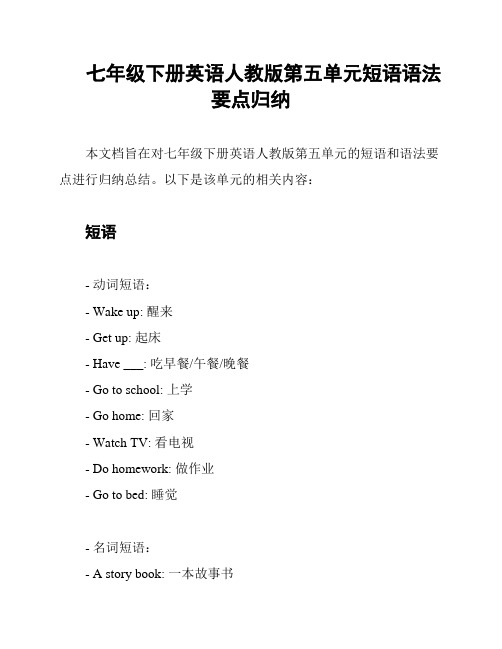
七年级下册英语人教版第五单元短语语法要点归纳本文档旨在对七年级下册英语人教版第五单元的短语和语法要点进行归纳总结。
以下是该单元的相关内容:短语- 动词短语:- Wake up: 醒来- Get up: 起床- Have ___: 吃早餐/午餐/晚餐- Go to school: 上学- Go home: 回家- Watch TV: 看电视- Do homework: 做作业- Go to bed: 睡觉- 名词短语:- A story book: 一本故事书- A picture book: 一本图画书- A science book: 一本科学书- A history book: 一本历史书- 形容词短语:- ___: 在早上/下午/晚上- ___: 在家- ___: 在学校- At the library: 在图书馆- At the park: 在公园语法要点- 一般现在时:主语+动词原形(第三人称单数变为动词原形+s)- I often read books at home.- He/she usually goes to school by bus.- 直接引语和间接引语的转换- 直接引语:他说:“I like reading.”- 间接引语:He said (that) ___.- 一般过去时:主语+动词过去式- He watched TV last night.- 一般将来时:主语+will/shall+动词原形- We will go to the ___.- there be句型:There is/are+名词+地点- ___.以上是七年级下册英语人教版第五单元的短语和语法要点归纳。
希望对您有所帮助!。

人教版七年级下册-单元重点语法汇总U1情态动词can的用法can是情态动词,意为“能,会”,表示某人或某物具备的能力,还可用来提出请求,没有人称和数的变化,后面直接接动词原形。
下面学习情态动词can的常见用法。
1.表示“能力”,意为“能,会”。
例句:I can speak English.我会讲英语。
2.表示“请求”或“许可”。
例句:Can you help me with my Chinese?你能帮我学汉语吗?You can go to the park after you finish your homework.你做完作业后可以去公园。
3.含有情态动词can的肯定句变否定句时,需在can后加not,其缩写形式为can’t;变疑问句时,情态动词can直接放在句首,构成一般疑问句。
例句:I can sing English songs.我会唱英文歌。
(肯定句)→I can’t sing English songs.我不会唱英文歌。
(否定句)Yao Ming can play basketball.姚明会打篮球。
→Can Yao Ming play basketball?姚明会打篮球吗?(一般疑问句)4.对Can…问句的回答可以用下面几种形式:对询问能力的问句的回答可以说“Yes,…can.”或“No,…can’t.”,表示对能力的肯定或否定;对表示请求的问句的回答可以说“OK./All right.”,表示同意对方的请求。
也可用certainly或sorry来回答。
用certainly作肯定回答,语气更肯定;用sorry作否定回答,语气则更委婉、客气。
例句:—Can you speak English?你会说英语吗?—Yes,I can.是的,我会。
—Can I see your pencil-box,please?请问,我可以看一下你的铅笔盒吗?—All right./Certainly.Here you are.可以。
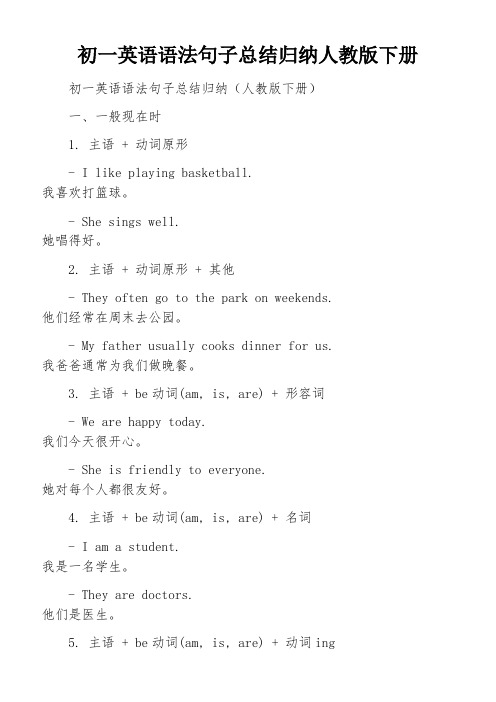
初一英语语法句子总结归纳人教版下册初一英语语法句子总结归纳(人教版下册)一、一般现在时1. 主语 + 动词原形- I like playing basketball.我喜欢打篮球。
- She sings well.她唱得好。
2. 主语 + 动词原形 + 其他- They often go to the park on weekends.他们经常在周末去公园。
- My father usually cooks dinner for us.我爸爸通常为我们做晚餐。
3. 主语 + be动词(am, is, are) + 形容词- We are happy today.我们今天很开心。
- She is friendly to everyone.她对每个人都很友好。
4. 主语 + be动词(am, is, are) + 名词- I am a student.我是一名学生。
- They are doctors.他们是医生。
5. 主语 + be动词(am, is, are) + 动词ing- He is playing football in the park.他正在公园里踢足球。
- We are watching a movie at home.我们正在家里看电影。
二、一般过去时1. 主语 + 动词过去式- I listened to music yesterday.昨天我听音乐。
- She played chess with her friends last night.昨晚她和朋友下棋。
2. 主语 + be动词(was, were) + 形容词- He was tired after school.放学后他感到累。
- They were happy at the party.派对上他们很快乐。
3. 主语 + be动词(was, were) + 名词- I was a student two years ago.两年前我是一名学生。

人教版七年级下册unit1+2核心考点及语法归纳【unit 1语法】一、情态动词can的基本用法情态动词can有一定的词义,但不能独立存在,它必须与动词原形一起构成谓语。
can没有人称和数的变化。
其具体用法如下:1.表示"能、会",指脑力或体力方面的"能力"。
例如:I can speak English.我会讲英语。
Jim can swim but I can't.吉姆会游泳,但我不会。
2.表示"可能",常用于否定句或疑问句中,指某种可能性。
例如:Han Mei can't be in the classroom.韩梅不可能在教室里。
Can he come here today, please?请问他今天能到这里来吗?3.表示"可以",常用于口语中,指许可或请求做某事。
例如:Can I have a cup of tea, please?请问我可以喝一杯茶吗?You can go out.你可以出去了?二、情态动词的注意事项1. can的口诀:情态动词can、can、can,动词原形跟后面。
变疑问can提前,变否定not后面加上去。
主语人称单复数,情态动词不能变。
2. 情态动词can可以引导肯定句和疑问句。
肯定句:主语+ can + 动词原形+ 其他成分疑问句:can + 主语+ 动词原形+ 其他成分3.can 引导的肯定句变为疑问句的方法:(一调二改三问号)can 提前,首字母大写。
(一调)肯定句中主语在变成疑问句时的变化。
(二改)如:肯定句:You can feed the animals.你可以喂动物。
疑问句:Can I feed the animals?我能喂动物吗?在句尾后面加问号。
(三问号)4. Can的一般疑问句回答:肯定回答:Yes,主语(必须人称代词)+ can.否定回答:No,主语(必须人称代词)+ can not (can’t)/mustn’t. Yes 或no 后要使用逗号,除了I 以外,其他人称都要小写。
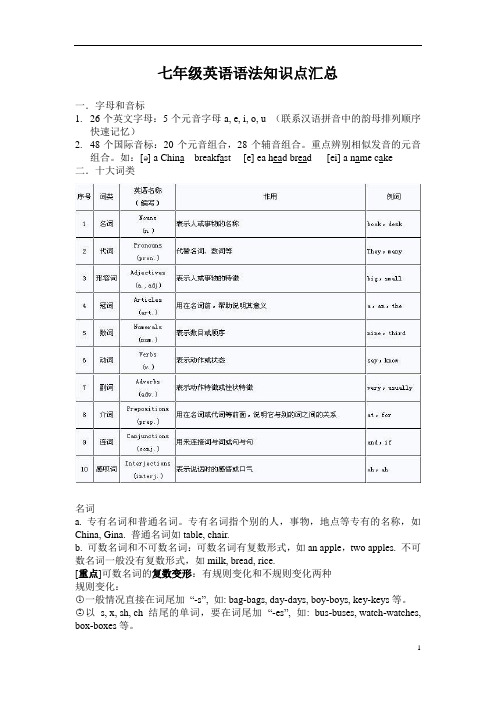
七年级英语语法知识点汇总一.字母和音标1.26个英文字母:5个元音字母a, e, i, o, u (联系汉语拼音中的韵母排列顺序快速记忆)2.48个国际音标:20个元音组合,28个辅音组合。
重点辨别相似发音的元音组合。
如:[ə] a China breakfast [e] ea head bread [ei] a name cake 二.十大词类名词a. 专有名词和普通名词。
专有名词指个别的人,事物,地点等专有的名称,如China, Gina. 普通名词如table, chair.b. 可数名词和不可数名词:可数名词有复数形式,如an apple,two apples. 不可数名词一般没有复数形式,如milk, bread, rice.[重点]可数名词的复数变形:有规则变化和不规则变化两种规则变化:○1一般情况直接在词尾加“-s”, 如: bag-bags, day-days, boy-boys, key-keys等。
○2以s, x, sh, ch结尾的单词,要在词尾加“-es”, 如: bus-buses, watch-watches, box-boxes等。
○3以辅音字母加y结尾的单词,要变y为i再加“-es”, 如:baby-babies, country-countries, family-families等。
○4部分以f (e)结尾的单词,要变f (e)为“ves”, 如:knife-knives, half-halves等。
顺口溜:小偷(thief)的妻子(wife),为了自己(self)保命(life),站到架子上(shelf),用树叶(leaf)做的小刀(knife),将狼(wolf)劈成了两半(half)○5以字母“o”结尾的单词,没有生命的加“-s”,有生命的加“-es”,如:zoo-zoos, photo-photos, tomato-tomatoes.口诀:黑人(Negro)英雄(hero)爱在火山(volcano)吃土豆(potato)西红柿(tomato)不规则变化:○1改变单数名词中的元音字母:man-men, woman-women, foot-feet, tooth-teeth等。

一、动词的一般现在时人教版英语七年级下册的重要语法内容之一为动词的一般现在时。
在学习动词的一般现在时时,学生需要掌握动词的三单特殊变化规则,即在第三人称单数时,动词需要在词尾加上-s或-es。
学生还需要学习动词的否定形式和疑问形式的构成方法,以及常见的一般现在时的时间状语如often, usually, always等的用法。
二、名词的单数和复数形式另一个重要的语法内容是名词的单数和复数形式。
学生需要了解名词单数和复数形式的规则,掌握常见的名词复数变化规则,如在词尾加上-s, -es, -ies等。
学生还要熟练掌握一些不规则名词的复数形式,如man-men, woman-women等。
三、形容词的比较级和最高级形容词的比较级和最高级也是七年级下册的重要语法内容之一。
学生需要学习形容词比较级的构成方法以及常见的比较级形式,如比较级+than, more+形容词等。
学生还需要了解形容词最高级的构成方法以及常见的最高级形式,如the+形容词最高级, most+形容词等。
四、介词的基本用法介词是英语中一个重要的语法内容,学生需要掌握介词的基本用法,包括介词表示地点、时间、方向、原因等的用法,以及介词与动词、名词、形容词的搭配。
学生还需要学习一些常用介词的用法,如in, on, under, behind, between等。
五、情态动词情态动词是七年级下册的另一个重要语法内容。
学生需要了解情态动词can, could, may, might, must, shall, should, will, would等的用法和意义,并能正确运用这些情态动词进行句子的构成。
学生还需要学习情态动词的否定形式和疑问形式的构成方法。
六、并列连词和从属连词七年级下册还包括并列连词和从属连词的学习。
学生需要了解并掌握一些常见的并列连词如and, but, or等的用法,以及从属连词如because, when, if, although等的用法。
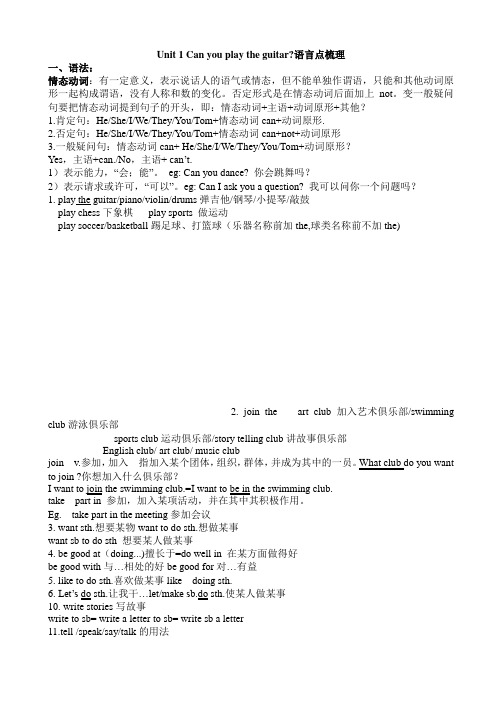
Unit 1 Can you play the guitar?语言点梳理一、语法:情态动词:有一定意义,表示说话人的语气或情态,但不能单独作谓语,只能和其他动词原形一起构成谓语,没有人称和数的变化。
否定形式是在情态动词后面加上not。
变一般疑问句要把情态动词提到句子的开头,即:情态动词+主语+动词原形+其他?1.肯定句:He/She/I/We/They/You/Tom+情态动词can+动词原形.2.否定句:He/She/I/We/They/You/Tom+情态动词can+not+动词原形3.一般疑问句:情态动词can+ He/She/I/We/They/You/Tom+动词原形?Yes,主语+can./No,主语+ can’t.1)表示能力,“会;能”。
eg: Can you dance? 你会跳舞吗?2)表示请求或许可,“可以”。
eg: Can I ask you a question? 我可以问你一个问题吗?1. play the guitar/piano/violin/drums弹吉他/钢琴/小提琴/敲鼓play chess下象棋play sports 做运动play soccer/basketball踢足球、打篮球(乐器名称前加the,球类名称前不加the)2. join the art club加入艺术俱乐部/swimming club游泳俱乐部sports club运动俱乐部/story telling club讲故事俱乐部English club/ art club/ music clubjoin v.参加,加入指加入某个团体,组织,群体,并成为其中的一员。
What club do you want to join ?你想加入什么俱乐部?I want to join the swimming club.=I want to be in the swimming club.takeEg. take part in the meeting参加会议3. want sth.想要某物want to do sth.想做某事want sb to do sth 想要某人做某事4. be good at(doing...)擅长于=do well in 在某方面做得好be good with与…相处的好be good for对…有益5. like to do sth.喜欢做某事like doing sth.6. Let’s do sth.让我干…let/make sb.do sth.使某人做某事10. write stories写故事write to sb= write a letter to sb= write sb a letter11.tell /speak/say/talk的用法1) tell讲述一件事实或故事等及物动词tell sb. sth 给某人讲某事=tell sth to sb 把某事告诉某人tell sb. to do sth 告诉某人做某事tell stories讲故事=tell a story tell a lie撒谎2)speak v. 主要是讲说话的能力,往往接语言speak English讲英语3)talk 为不及物动词往往加介词再接宾语talk to sb.和…交谈/talk with sb.和…交谈(指双方)4)say往往接说话的内容eg.Our teacher says we should study hard.say it in English用英语说它12. make friends with sb.和…交朋友13. play games with sb.和…做游戏14. help sb. with sth.= help sb. (to) do sth.帮助某人做某事15. call sb. at +电话号码给某人打电话拨+号码16. on /at the weekend 在周末on weekends after school放学后17.do Chinese kung fu 打中国功夫18.be free 空闲的19. sing very well 唱得好That sounds good. 那听起来很好20.English-speaking students 讲英语的学生学生运动中心23.also /too/eitheralso/too用在肯定句,also 用于句中,too 用于句尾,either用于否定句句未eg. I am a student . He is a student,too. I am a student . He is also a student.I am not a student . He is not a student, either.24.and/or 连接两个并列成分eg.I can sing and dance.(and用于肯定句)I can’t sing or dance.(or用于否定句)Can you sing or dance ?(or用于选择疑问句“或者”)25.at27. need to do sth需要干某事need sb. to do sth 需要某人干某事28.wanted students for School show学校表演招聘学生v.展示;给….看… show sb. Sth= show Sth to sb.给某人展示n.节目;表演TV show电视节目29.teach v.教,讲授teacher n.教师teach sb.English教某人英语teach sb. sth .= teach sth to sb.教给某人某事=教某事给某人teach sb.to do sth教给某人做某事30.music n.音乐musician n. 音乐家31.piano (pl.) pianosUnit 2 What time do you go to school?知识点梳理1.What time do you get up?What time +助动词do/does +主语+动词原形,询问某人做某事的具体时间。
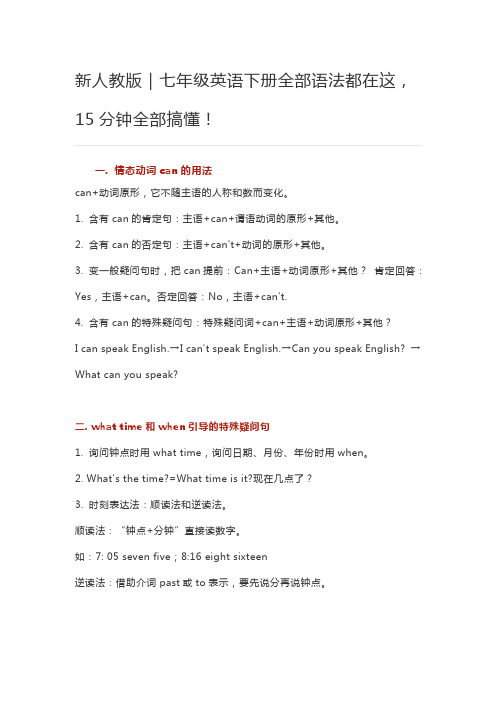
新人教版|七年级英语下册全部语法都在这,一. 情态动词can的用法can+动词原形,它不随主语的人称和数而变化。
1. 含有can的肯定句:主语+can+谓语动词的原形+其他。
2. 含有can的否定句:主语+can't+动词的原形+其他。
3. 变一般疑问句时,把can提前:Can+主语+动词原形+其他?肯定回答:Yes,主语+can。
否定回答:No,主语+can't.4. 含有can的特殊疑问句:特殊疑问词+can+主语+动词原形+其他?I can speak English.→I can't speak English.→Can you speak English? →What can you speak?二. what time和when引导的特殊疑问句1. 询问钟点时用what time,询问日期、月份、年份时用when。
2. What's the time?=What time is it?现在几点了?3. 时刻表达法:顺读法和逆读法。
顺读法:“钟点+分钟”直接读数字。
如:7: 05 seven five;8:16 eight sixteen逆读法:借助介词past或to表示,要先说分再说钟点。
a. 当分钟不超过30分钟时(包括30分钟),即<或=30,用past表示。
其结构为:“分钟+past+整点”意为“几点过几分”。
如:1:25 twenty-five past oneb. 当超过30分钟时,即>30,用to表示。
其结构为:“所差分钟(即60—所过分钟数)+to+下一个整点”,to译成“差”,差几分钟到几点。
如:4:38 twenty-two to fivec. 当分钟为30分钟用half表示,当分钟为15分钟用a quarter。
三. how引导的特殊疑问句1. how 引导的特殊疑问句提问交通方式,其答语分三种情况:a. take a/an/the+交通工具(单数)b. by+交通工具(单数)c. on/in+限定词+交通工具---How do you go to school every day?---I take a bus to go to school every day./I go to school by bus every day./I go to school on the bus every day.2. how far 用来提问距离,多远,其答语分为两种:(1)用长度单位表示:It is five kilometers.(2)用时间表示:It’s twenty minutes’walk.3. how long 用来提问时间,意为多久回答常用“for+段时”。

人教版初中英语七年级下册全册各单元知识点及语法归纳整理Unit 1 Can you play the guitar?◆短语归纳1. play chess 下国际象棋2. play the guitar 弹吉他3. speak English 说英语4. join the swimming club 参加游泳俱乐部5. talk to 主动跟…说话6. talk with与…说话7. play the piano 弹钢琴8. play the drums 敲鼓9. make friends with与朋友10. do kung fu 练(中国) 功夫11. tell stories=tell a story 讲故事12. play games 做游戏13. on the weekend/on weekends 在周末14 want to do 想要去做15 music(音乐)-musician(音乐家)◆用法集萃1. play +棋类/球类下……棋,打……球[不戴帽子]2. play the +乐器弹/拉……乐器[戴帽子]3. be good at doing sth.= do well in doing sth. 擅长做某事4. need sb. to do sth. 需要某人做某事5. be good with sb. 和某人相处地好be good for 有利于6. can + 动词原形能/会做某事[can是照妖镜]7. a little + 不可数名词一点儿……8. join the …club 加入…俱乐部;9. like to do sth. =love to do sth.=like doing=enjoy doing 喜欢/喜爱做某事come to my school◆典句必背1. Can you draw? Yes, I can. / No, I can’t.2. What club do you want to join? I want to join the chess club.3. You can join the English club.4. Sounds good./That sounds good.5 What can you do?6. I can speak English and I can also play soccer.7. Please call Mrs. Miller at 555-3721. 8.tell sb (not)to do 告诉某人(不)要去做某事。

Unit1 Can you play the guitar【重点单词】guitar [ɡɪ'tɑ:(r)] n. 吉他sing [sɪŋ] v. 唱;唱歌swim [swɪm] v. & n. 游泳dance [dɑːns], [dæns] v. 跳舞 n. 舞蹈draw [drɔː] v. 画chess [tʃes] n. 国际象棋play chess 下国际象棋speak [spiːk] v. 说(某种语言);说话speak English 说英语join [dʒɔɪn] v. 参加;加入club [klʌb] n. 俱乐部;社团be good at… 擅长于……tell [tel ] v. 讲述;告诉story ['stɔːrɪ] n. 故事;小说write [raɪt] v. 写作;写字show [ʃəʊ] n. 演出;节目 v. 给……看;展示;or [ɔː(r)] conj. 或者;也不(用于否定句)talk [tɔːk] v. & n. 说话;交谈talk to … 跟……说kungfu [,kʌŋ’fuː] n.(中国)功夫drum [drʌm] n. 鼓play the drums 敲鼓piano [pɪ'ænəʊ] n. 钢琴play the piano 弹钢琴violin [,vaɪə'lɪn] n. 小提琴play the violin 拉小提琴also ['ɔːlsəʊ] adv. 也;而且people ['piːpl] n. 人;人们home [həʊm] n. 家;活动本部 adv. 到家;在家be good with… 善于应付……的;对……有办法make [meɪk] v. 使成为;制造make friends 结交朋友today [tə'deɪ] adv. 在今天help (sb) with sth 在某方面帮助(某人)center ['sentə(r)] n.(=centre)中心;中央weekend [,wiːk'end], [ 'wiː kend] n. 周末on the weekend (在)周末teach [tiːtʃ ] v教;讲授musician [mjuː'zɪʃn] n. 音乐家【重点短语】1. play the guitar 弹吉他2. play chess 下棋3. speak English 说英语3. what to do sth 想做某事4. join the music club 加入音乐俱乐部5. match…..with 与……匹配6. the swimming club 游泳俱乐部7. what club 什么俱乐部8. a sports club 一个体育俱乐部10. be good at telling stories 擅长讲故事11. the story telling club 讲故事俱乐部12. like to do/doing sth 喜欢做某事13. let’s join 让我们加入......14. sound good 听起来不错15. students wanted for School Show 学校表演招聘学生16. talk to/with sb 跟某人谈话17. after school 放学后18. do kung fu 表演功夫;练功夫19. show sb. sth.=show sth. to sb. 把某物展示给某人20. play games with people 和人们做游戏21.be in the school music club 在学校音乐俱乐部22. help for old people 对老人的帮助23. be good with… 和某人相处得好,善于和..打交道24. be free / be busy 空闲的/忙的25. in July 在六月份26. tell sb. stories 给某人讲故事27. make friends with… 和某人交朋友28. call sb. at …… 给某人打……29. on the weekend 在周末30. help sb.(to)do sth. 帮助某人做某事31. help sb. with sth. 在某方面帮助某人32. English-speaking students 说英语的学生33. It is+adj +(for sb)to sth. 做某事(对于某人来说)是…..34. play the piano 弹钢琴35. play the violin 拉小提琴36. t he Students’ Sports Center学生运动中心37. need help to teach music 需要帮助来做某事38. need sb. to do sth 需要某人做某事39. teach sb. to do sth 教某人做某事40. be in our school music festival 参加我们学校的音乐节【重点句型】1. —Can you swim你会游泳吗?—No,I can’t.不,我不会。

Unit 1 Can you play the guitar?Section A1A1.join v. 参加,加入(团体、社团、组织)joins 第三人称✓join+ 团体/组织1)join the club 参加社团、俱乐部2)join the army 参军eg. My brother want s to join the army. 我哥哥想参军。
3)join the Young Pioneers 加入少先队(专有名词大写)4)join the NBA 加入(美国)全国篮球协会✓join的用法1)join + sb(动词的人后都用宾格)Do you want to join us? 你想加入我们吗?2)join + sb(宾格)+for thingI want you to join us for the concert.我想让你加入我们一起准备音乐会。
3)join + sb(宾格)+to d o somethingI want to join them to go to the Great Wall.4)join + sb(宾格)+ in d oing somethingCan I join you in playing the game? 我能加入你们一起玩游戏吗?宾格:me/ you/ him/ her/ it/ us/ you/ them/5)join in +( sth)Peter d oesn’t want to join in the conversation. Peter不想加入谈话。
2.club n. 俱乐部、社团(复数clubs)the art club 美术俱乐部the swimming club 游泳俱乐部the English club 英语俱乐部the basketball club 篮球俱乐部the music club 音乐俱乐部3.can 是情态动词,表示“能够,会,能”1)can后加动词原型I can draw;She can sing and dance;They can play the guitar.2)否定式can’t =cannot3) 疑问句式:can+主语+动词原型(你会……吗?)Can he play the chess?Yes, he can/No, he can’t.4)第二个意思:表示请求,征求意见Can I watch TV, Dad? Sure 我能看电视吗?爸爸。
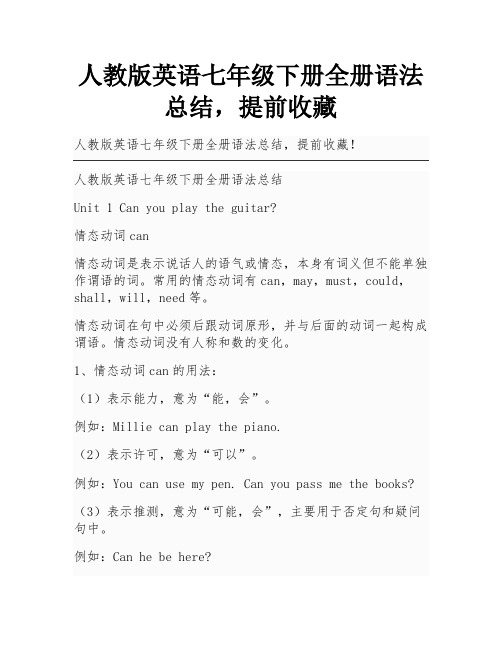
人教版英语七年级下册全册语法总结,提前收藏人教版英语七年级下册全册语法总结Unit 1 Can you play the guitar?情态动词can情态动词是表示说话人的语气或情态,本身有词义但不能单独作谓语的词。
常用的情态动词有can,may,must,could,shall,will,need等。
情态动词在句中必须后跟动词原形,并与后面的动词一起构成谓语。
情态动词没有人称和数的变化。
1、情态动词can的用法:(1)表示能力,意为“能,会”。
例如:Millie can play the piano.(2)表示许可,意为“可以”。
例如:You can use my pen. Can you pass me the books?(3)表示推测,意为“可能,会”,主要用于否定句和疑问句中。
例如:Can he be here?He can’t have finished his homework.Unit 2 What time do you go to school?频度副词英语中常见的频度副词有usually, sometimes, always, often, seldom, never等,它们用来表示动作发生的频率,但是在程度上有所区别,频率由高到低依次是:always>usually>often>sometimes>seldom>never。
频度副词放在be动词、情态动词和助动词之后,实义动词之前,对频率的提问用how often。
He’s always busy.I never play a trick on others.Unit 3 How do you get to school?how, how long和how far引导的特殊疑问句how用来提问方式,表示“如何”;how long用来提问时间,表示“多长时间”;how far用来提问距离,意为“多远”。
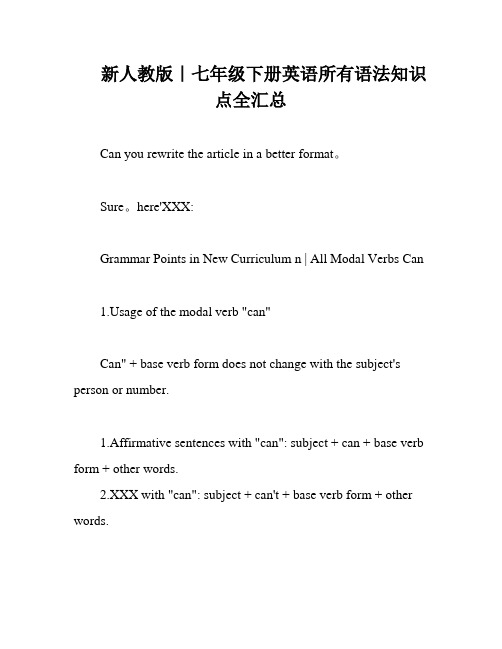
新人教版|七年级下册英语所有语法知识点全汇总Can you rewrite the article in a better format。
Sure。
here'XXX:Grammar Points in New Curriculum n | All Modal Verbs Canage of the modal verb "can"Can" + base verb form does not change with the subject's person or number.1.Affirmative sentences with "can": subject + can + base verb form + other words.2.XXX with "can": subject + can't + base verb form + other words.3.To form a yes/no n。
move "can" to the beginning: Can + subject + base verb form + other words。
Positive answer: Yes。
subject + can。
Negative answer: No。
subject + can't.4.XXX "can": n word + can + subject + base verb form + other words.XXX: I can speak English。
→ I can't speak English。
→ Can you speak English。
→ What can you speak?2.XXX with "what time" and "when"e "what time" to ask for the hour and "when" to ask for the date。
![最全的人教版七年级英语语法总结[1]](https://img.taocdn.com/s1/m/8aa0f0cb3169a4517623a3e5.png)
(完整 word 版)最全的人教版七年级英语语法总结(word 版可编辑修改)(完整 word 版)最全的人教版七年级英语语法总结(word 版可编辑修改)编辑整理:尊敬的读者朋友们: 这里是精品文档编辑中心,本文档内容是由我和我的同事精心编辑整理后发布的,发布之前我们对 文中内容进行仔细校对,但是难免会有疏漏的地方,但是任然希望((完整 word 版)最全的人教版 七年级英语语法总结(word 版可编辑修改))的内容能够给您的工作和学习带来便利。
同时也真诚 的希望收到您的建议和反馈,这将是我们进步的源泉,前进的动力。
本文可编辑可修改,如果觉得对您有帮助请收藏以便随时查阅,最后祝您生活愉快 业绩进步,以 下为(完整 word 版)最全的人教版七年级英语语法总结(word 版可编辑修改)的全部内容。
(完整 word 版)最全的人教版七年级英语语法总结(word 版可编辑修改)七年级语法总结1、目前所学的动词的形式有 4 种: ①动词原形;如:do;have;like ②动词的单三式(常在动词原形后加 s);如:get-gets ③动词不定式(to+动词原形);如:meet-to meet ④动词 ing 式(动词原形后加 ing)如:look—looking 2、表示征求意见或建议邀请的礼貌用语 Would you like +to+动词原形? (你想要……吗?) How about+动词 ing ?(……怎么样?……好不好?) What about +动词 ing? (……怎么样?……好不好?) Why not +动词原形? (为什么不……呢?) Why don’t you +动词原形 ?(你为什么不……呢?) Let’s +动词原形.(让我们……吧。
) 表示同意、答应:①Yes,I'd like to./Oh,I’d love to。
②All right/OK。
③Great!④Sure。
人教版七年级下册英语语法总结Unit 1 Where’s your pen pal from? (语法点总结)一.短语:1 .be from = come from 来自于----2. live in 居住在---3. on weekends 在周末4 .write to sb = write a letter to sb 给某人写信;写信给某人5 .in the world 在世界上in China 在中国6.pen pal 笔友14 years old 14岁favorite subject 最喜欢的科目7.the United States 美国the United Kingdom 英国New York 纽约8.speak English 讲英语like and dislike 爱憎9.go to the movies 去看电影play sports 做运动二.重点句式:1 Where’s your pen pal from? = Where does your pen pal from/2 Where does he live?3 What language(s) does he speak?4 I want a pen pal in China.5 I can speak English and a little French.6 Please write and tell me about yourself.7 Can you write to me soon?8 I like going to the movies with my friends and playing sports.三.本单元的国家,人民、语言对应。
1 Canada---- Canadian---- English / French2 France------ French------French3 Japan------Japanese----Japanese4 Australia----Australian----- English5 the United States------ American---- English6 the United Kingdom---British----- EnghishUnit 1 Where’s your pen pal from?(短语句型汇总)一、词组be from= come form 来自...pen pal=pen friend 笔友like and dislike 好恶;爱憎live in….在...居住speak English 讲英语play sports 做体育运动a little French 一些法语go to the movies 去看电影an action movie 一部动作片on weekends 在周末Excuse me 对不起,打扰get to 到达、抵达beginning of 在...开始的时候at the end of 在...结束的时候arrive at /二、句型(1)、Where主 +be+主语+from?主语+be +from+地点.(2)、Where do/does+主语+live?主语+live/lives in…(3)、What language do/does +主语+speak?主语+speak/speaks….(4)、主语+like/likes +doing…三、日常交际用语1-Where is your pen pal from?-He’s from China.2-Where does she live?--She lives in Tokyo.3-Does she speak English?-Yes, she does/ No, she dosen’t.4-Is that your new pen pal?-Yes, he is / No, e isn’t.5-What language does she speak?-She speaks English.Unit 2 Where’s the post office? (语法点总结) 一. Asking ways: (问路)1.Where is (the nearest) ……?(最近的)……在哪里? 2.Can you tell me the way to ……?你能告诉我去……的路吗?3.How can I get to ……?我怎样到达……呢?4.Is there …… near here / i n the neighborhood? 附近有……吗?5.Which is the way to ……?哪条是去……的路?二.Showing the ways: (指路)1. Go straight down / along this street. 沿着这条街一直走。
2. Turn left at the second turning. 在第二个路口向左转。
3. You will find it on your right. 你会在你右手边发现它。
4. It is about one hundred metres from here. 离这里大约一百米远。
5. You’d better take a bus. 你坐公交车去。
(You’d better+动词原形)三.词组1. across from …… 在……的对面 across from the bank 在银行的对面2. next to…… 紧靠…… next to the supermarket 紧靠超市3. between……and…… 在……和……之间between the park and the zoo 在公园和动物园之间among 表示位于三者或三者以上之间4. in front of…… 在……前面 There is a tree in front of the classroom.课室前面有棵树。
in the front of…… 在……(内)的前部 There is a desk in the front of the classroom.课室内的前部有张桌子。
5. behind…… 在……后面 behind my house 在我家后面6. turn left/ right 向左/右拐on the left/right of…… 在某物的左/右边 on the left of our school 在我们学校的左边on one’s left/right 在某人的左/右边 on my left 在我左边 7. go straight 一直走8. down /along…… 沿着……(街道) down/along Center Street 沿着中央街9. in the neighborhood=near here 在附近10 welcome to…… 欢迎来到……11. take /have a walk 散步12. the beginning of…… ……的开始,前端at the beginning of…… 在……的开始,前端in the beginning 起初,一开始13. have fun=have a good time=enjoy oneself 玩得开心,过得愉快我昨天玩得很开心。
I had fun yesterday.I had a good time yesterday.I enjoyed myself yesterday.14. have a good trip 旅途愉快15. take a taxi 坐出租车16. 到达:get to +地方get here/ there/ home 到这/那/家 arrive in +大地方 I arrive in Beijing.arrive at +小地方 I arrive at the bank.reach +地方17.go across 从物体表面横过 go across the street 横过马路go through 从空间穿过 go through the forest 穿过树林18.on + 街道的名称。
Eg: on Center Streetat + 具体门牌号+街道的名称 Eg: at 6 Center Street 三.重难点解析1.enjoy doing sth 享受做某事的乐趣,喜爱做某事I enjoy reading. 我喜爱读书。
到目前为止,我们学了两个特殊的动词finish和enjoy,都是要带 doing.I finish cleaning the room. 我扫完了这间屋子。
2.hope to do sth 希望做某事 I hope to pass this exam. 我希望通过这次考试。
hope +从句 I hope tomorrow will be fine. 我希望明天将会晴朗。
(从句即是一个小句子,这个小句子又放在大句子中,从属于大句子,所以叫从句。
如tomorrow will be fine是一个从句,它又放在I hope 的后面,形成句中有句。
)3. if 引导一个表示假设的句子。
If I have much money, I will go to the moon. 如果我有许多钱,我就会去月球。
If you are hungry, you can buy some food in the supermarket.如果你饿了的话,你可以在超市买一些食物。
四.本单元的反义词、近义词配对1new—old 2 quiet--- busy 3 dirty--- clean 4 big---- small。